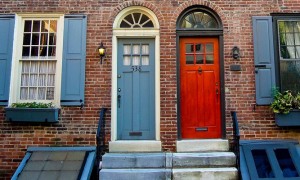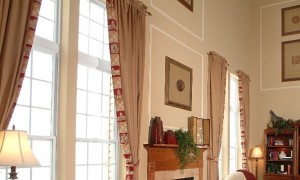Installing outdoor speakers is an easy way to add mood music for summer patio parties or to stay up to date on the Phillies game while you lounge on your deck. Designed to withstand all ranges of temperature, as well as wind and rain, weatherproof outdoor speakers are also convenient when July and August pop-up thunderstorms roll through town. Outdoor speakers generally cost more than those designed for indoor use, but a wide range of price points and design options are available to fit everyone’s budget.
Go Wireless
If you prefer speakers that you can have unboxed and ready for the Phillies 1:05 p.m. start time, easy-to-install wireless speakers may be your best option. Improvements in audio technology have resulted in an impressive sound quality for higher-end wireless speakers. Portable wireless speakers come in an array of styles and sizes, and many are designed for both indoor and outdoor use. To hook them into your home audio system, look for Bluetooth-compatible devices which can be controlled via an app or remote control. If you’re planning to use your wireless speakers outside, keep in mind that speakers billed as weather-resistant (as opposed to weather-proof) should be taken indoors when not in use, as they can’t withstand the elements.
Make It a DIY Project
Installing outdoor speakers takes patience and can be challenging, depending on your level of technical knowledge and your desire to DIY. To achieve optimal sound and placement, plan to invest a few hours of time and energy into running speaker wire between your sound system and your outdoor speakers. Location is extremely important for the best sound output in an outdoor setting, so try testing the equipment in several locations before finalizing installation.
Most outdoor speakers, such as these Bose environmental speakers, come with mounting brackets to help attach the speakers to an exterior wall. Outdoor speakers are available in a range of colors to match the paint colors of overhangs, walls, or decks. If you prefer an in-ground setup, try installing outdoor speakers specifically made to blend in with your landscaping such as these rock-shaped speakers. In-ground speakers require a special wire designed to be buried and run underground. You should also follow the National Electric Code, which requires electric wire to be buried at least 18 inches through a rigid nonmetal conduit such as PVC pipe. If you’re using powered equipment to dig, you’ll need to contact PA One Call to inspect the area for other underground wires or pipes.
Hire a Professional
Another option for installing outdoor speakers is to have a professional do it for you. When shopping around for outdoor speakers, ask retailers for professional recommendations and the cost of labor. Even if you decide to install the speakers on your own, a professional can scope out your outdoor living space and recommend the number of speakers and best placement prior to purchase.
After a long East Coast winter, soak up the extra hours of sunlight outdoors by grilling on your deck, with music or sports in the background.
Photo Credit: Flickr/Steven Depolo
[cf]skyword_tracking_tag[/cf]






